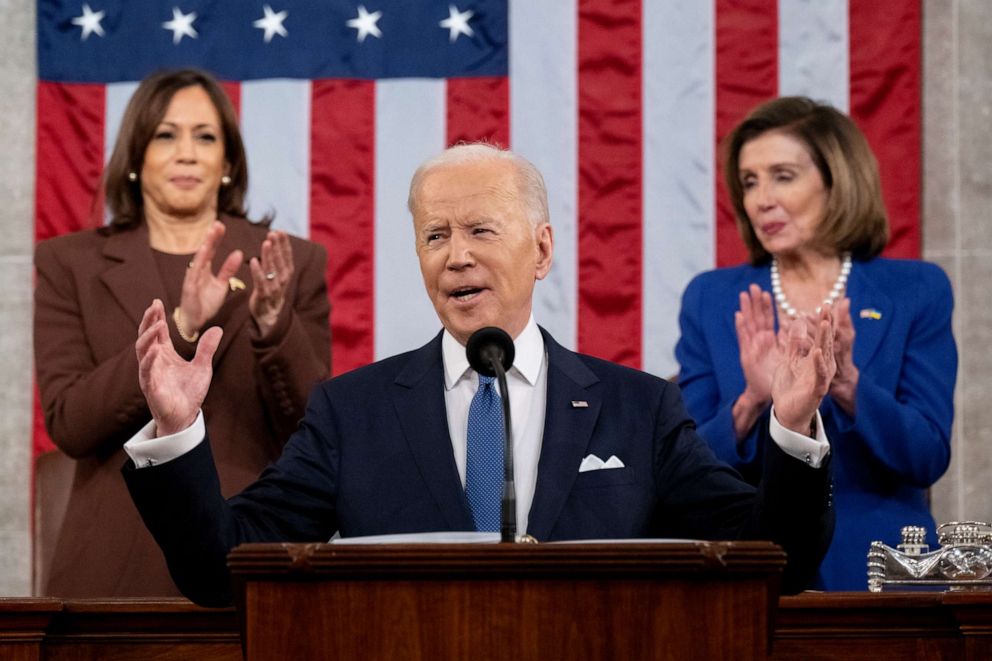预计美国总统乔·拜登将在周二宣扬美国的经济情况的健全程度在他的国情咨文中,仅仅几天后一鸣惊人工作报告显示强劲的劳动力市场与持续一个月的通货膨胀。
然而,展望未来,拜登预计将提出解决他认为持续存在的经济弊病的方案:收入和财富不平等。
根据一项调查,2021年,最富有的1%的人的财富增加了6.5万亿美元研究去年发行的美联储。研究发现,美国最富有的那一小部分人控制着全国32%的财富。
拜登政府的议程将于周二晚上宣布,包括两项政策建议:对亿万富翁征收新税,以及大幅提高公司股票回购的现行税率。
密歇根大学专注于企业税的法学教授鲁文·阿维-约纳对美国广播公司新闻说:“这个想法是承诺减少不平等。”“没有迹象表明不平等的加剧会很快停止,应该对此采取一些措施,所以民主党人说。”
关于拜登对富裕个人和企业的预期税收提案,我们应该了解以下内容:
亿万富翁税
拜登新经济政策议程的一个关键部分是亿万富翁税,这将为最富有的美国人设定最低税收,白宫说。
拜登政府对该提案提供的细节很少,但它似乎非常类似于一个政策拜登去年三月提出的。当时,他呼吁对年收入至少1亿美元的美国人征收至少20%的税率。
该税率将适用于收入和未实现收益,衡量一个人未出售投资积累的价值。
白宫周二在一份声明中表示:“拜登总统是一名资本家,他认为任何人都应该能够成为百万富翁或亿万富翁。”。“他还认为,美国的税法导致美国最富有的家庭缴纳的税率低于工薪家庭,这是错误的。”
白宫经济顾问委员会称,在2018年至2020年间,美国最富有的400个家庭支付的平均税率为8%找到。

2022年3月1日,美国总统乔·拜登在美国国会大厦发表国情咨文。
彭博通过盖蒂图片社
2014年至2018年间,最富有的25人的财富总共增加了4010亿美元,但他们为这笔财富支付的平均联邦所得税为3.4%找到去年。该渠道称,相比之下,年收入7万美元的美国人平均缴纳14%的联邦所得税。
密歇根大学的Avi-Yonah说,该提案可能会面临共和党的坚决反对,使其成为法律的可能性很低,因为共和党控制了众议院。
针对此前向美国富人征税的努力,共和党人表示,这些措施抑制了商业投资和财富创造,阻碍了经济增长。
Avi-Yonah说:“事实是,在共和党控制众议院的情况下,该法案不会通过。”“所以是修辞。”
提高股票回购税
除了亿万富翁税,拜登政府预计将提议大幅提高目前对公司股票回购的税收。
公司选择购买自己的股票作为向股东返还资金的一种方式,因为这一举动通常会抬高股价。
根据白宫的说法,拜登政府对这种做法有异议,因为它为股东提供了资金,同时逃避了公司通过股息向股东分配资金时征收的所得税。相反,股票回购将资金作为资本利得返还给投资者,税率较低。
“股票回购使公司能够将税收优惠支付给富人和外国投资者,”白宫周二表示。
拜登于2022年8月签署的《通货膨胀削减法案》对股票回购征收1%的税。例如,如果一家公司购买价值1亿美元的股票,它必须支付100万美元的税款。
白宫表示,预计拜登将在国情咨文中提议将该税提高四倍至4%。
与亿万富翁税一样,股票回购税预计将面临共和党的强烈反对,成为法律的可能性很大。
哈佛大学法学院(Harvard Law School)专注于公司治理的教授杰西·弗里德(Jesse Fried)表示,他反对对股票回购征税,因为这些措施迫使公司要么持有多余的资本,要么将其投资于浪费的举措。
他说,相反,股票回购允许公司将资金返还给股东,然后股东可以投资或支出这些资金,从而刺激经济活动。
“你只会把更多的现金藏在公司里,”他说。
与此同时,Avi-Yonah表示,对股票回购征收更高税收的支持者认为,这一措施可能会迫使公司将资金投入到具有更大社会效益的计划中。
Avi-Yonah说,该政策的支持者表示,公司“应该把钱用在雇佣员工等其他事情上”。"股票回购是递减的,以牺牲其他所有人的利益为代价,让富人受益。"
Biden is set to propose higher taxes for the rich. Here's how they work.
President Joe Biden on Tuesday is expected to tout the nation'seconomic healthin his State of the Union Address, just days after a blockbusterjobs reportshowed a strong labor market has coincided with a monthslong easing ofinflation.
Looking ahead, however, Biden is expected to propose solutions for what he considers an ongoing economic ill: income and wealth inequality.
The wealth of the top 1% increased by $6.5 trillion in 2021, according to astudythe Federal Reserve released last year. That wealthiest sliver of Americans controls 32% of the country's wealth, the study found.
The Biden administration's agenda, set to be announced Tuesday night, includes two policy proposals: a new tax on billionaires and the sharp increase of a current tax on corporate stock buybacks.
"The idea is to have a commitment to reducing inequality," Reuven Avi-Yonah, a law professor at the University of Michigan who focuses on corporate taxes, told ABC News. "There's no indication that the increase in inequality is stopping anytime soon and something should be done about it, so the Democrats say."
Here's what to know about Biden's anticipated tax proposals for wealthy individuals and corporations:
Billionaire's tax
A key part of Biden's new economic policy agenda is a billionaire's tax, which would set a minimum tax for the wealthiest Americans, the White Housesaid.
The Biden administration has offered scant details about the proposal, but it appears to closely resemble apolicythat Biden put forward last March. At that time, he called for a tax rate of at least 20% on Americans who bring in at least $100 million per year.
The tax rate would apply both to income and unrealized gains, a measure of the value a person's unsold investments have accumulated.
"President Biden is a capitalist and believes that anyone should be able to become a millionaire or a billionaire," the White House said in a statement Tuesday. "He also believes that it is wrong for America to have a tax code that results in America's wealthiest households paying a lower tax rate than working families."
Between 2018 and 2020, the nation's wealthiest 400 families paid an average tax rate of 8%, the White House's Council of Economic Advisersfound.
The wealthiest 25 people saw their worth increase a combined $401 billion between 2014 and 2018, but they paid an average federal income tax of 3.4% on that wealth, ProPublicafoundlast year. By contrast, the median American making $70,000 a year pays an average federal income tax of 14%, the outlet said.
The proposal likely will face staunch Republican opposition, giving it a low probability of becoming law, since Republicans control the House of Representatives, Avi-Yonah of the University of Michigan said.
In response to previous efforts to tax wealthy Americans, Republicans have said the measures disincentivized business investment and wealth creation, hindering economic growth.
"The truth is it will not pass now with Republicans in control of the House," Avi-Yonah said. "So it's rhetoric."
Increase to the tax on stock buybacks
In addition to the billionaire's tax, the Biden administration is expected to propose a sharp increase of a current tax on corporate stock buybacks.
Companies opt to purchase shares of their own stock as a means of returning money to shareholders, since the move typically raises the price of shares.
The Biden administration takes issue with the practice because it provides money for shareholders while evading the taxes on income imposed when a company disperses money to shareholders through dividends, according to the White House. Instead, stock buybacks return money to investors as capital gains, which are taxed at a lower rate.
"Stock buybacks enable corporations to funnel tax-advantaged payouts to wealthy and foreign investors," the White House said Tuesday.
The Inflation Reduction Act, signed into law by Biden in August 2022, imposed a 1% tax on stock buybacks. If a company purchases $100 million worth of shares, for instance, it must pay $1 million in tax.
In his State of the Union Address, Biden is expected to propose quadrupling that tax to 4%, the White House said.
As with the billionaire tax, the levy on stock buybacks is expected to face strong Republican opposition and long odds to become law.
Jesse Fried, a professor at Harvard Law School focused on corporate governance, said he opposes a tax on stock buybacks because the measures force companies to either hold onto excess capital or invest it in wasteful initiatives.
Instead, stock buybacks allow companies to return money to shareholders, who can then invest or spend the money, spurring economic activity, he said.
"You're just going to have more cash bottled up in companies," he said.
Avi-Yonah, meanwhile, said proponents of a higher tax on stock buybacks argue that the measure could pressure companies to invest money in initiatives with greater social benefit.
Supporters of the policy say companies "should be using money for other things like hiring people," Avi-Yonah said. "Stock buybacks are regressive and benefit the rich at the expense of everyone else."






